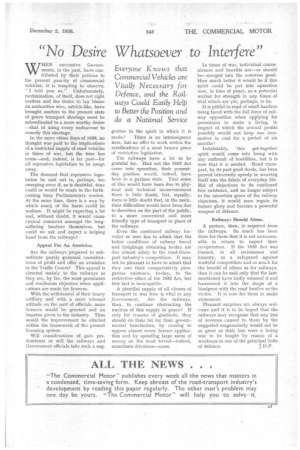"No Desire
Page 41

If you've noticed an error in this article please click here to report it so we can fix it.
WHEN successive Governments, in the past, have contributed by their policies to the present paucity of commercial vehicles, it is tempting to observe, " I told you so." Unfortunately, recrimination, of itself, does not right matters and the desire to lay blame on authorities who, ostrich-like, have brought matters to the present state of grave transport shortage must be subordinated to a more worthy desire —that of using every endeavour to
remedy this shortage. .
In the more otiose days of 1933, no thought was paid, to the implications of a restricted supply of road vehicles in times of war, but the time has come—and, indeed, is far past—for all repressive legislatipn to be swept away.
The demand that repressive legislation be cast out is, perhaps, too sweeping even if, as is doubtful, time could or would be made in the forthcoming busy Parliamentary session. At the same time, there is a way by which much of the harm could be undone. It might be expecting a lot and, without doubt, it would cause cynical comment amongst the longsuffering hauliers themselves, but could we ask and expect a helping hand from the railways?
. Appeal For An Armistice.
Are the railways prepared to subordinate purely cersonal considerations of profit and offer an armistice in the Traffic Courts? This appeal is directed mainly to the railways as they are, by far, the most prominent and vociferous objectors when applications are made for licences.
With the withdrawal of their heavy artillery and with a more tolerant attitude on the part of officials, more licences would be granted and an impetus given to the industry. Thus would the improvement be effected within the framework of the present licensing system.
Will considerations of gain predominate or will the railways and Government officials take such a sug




























































































